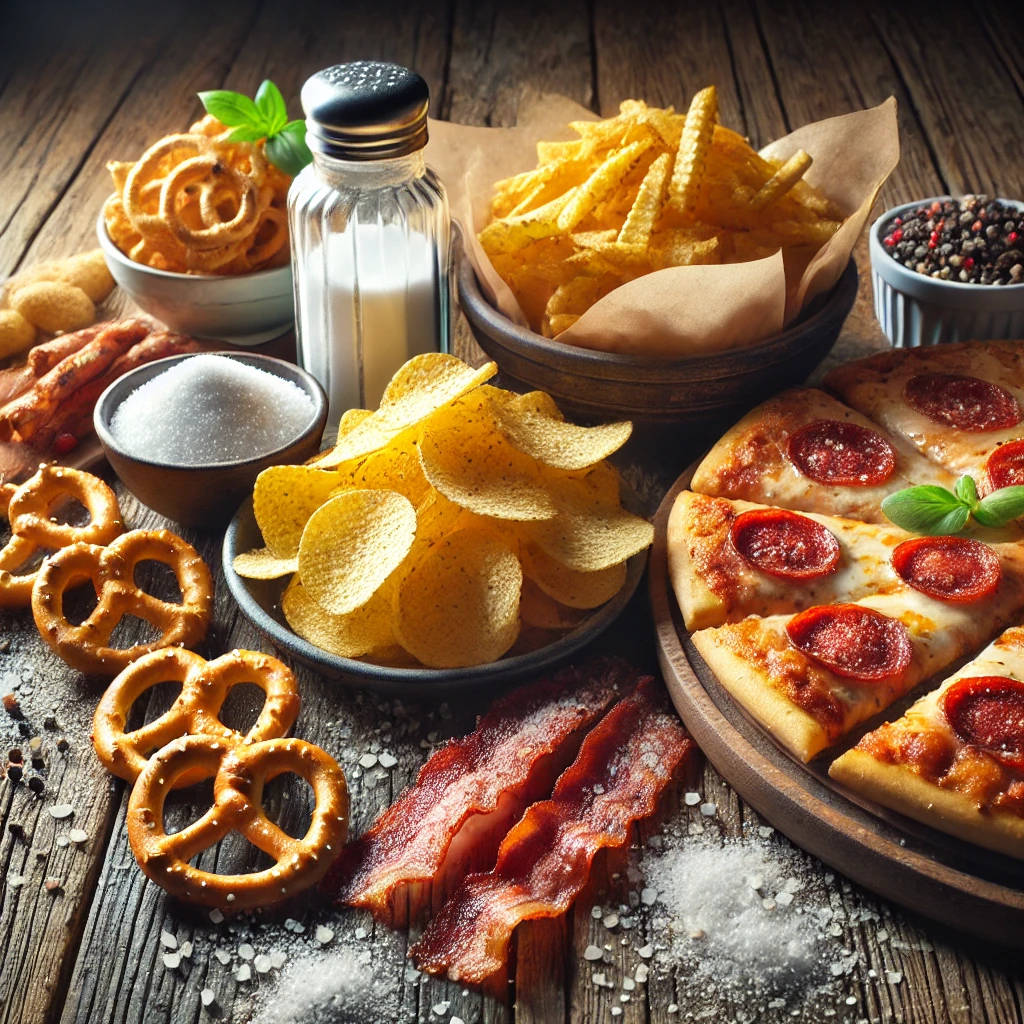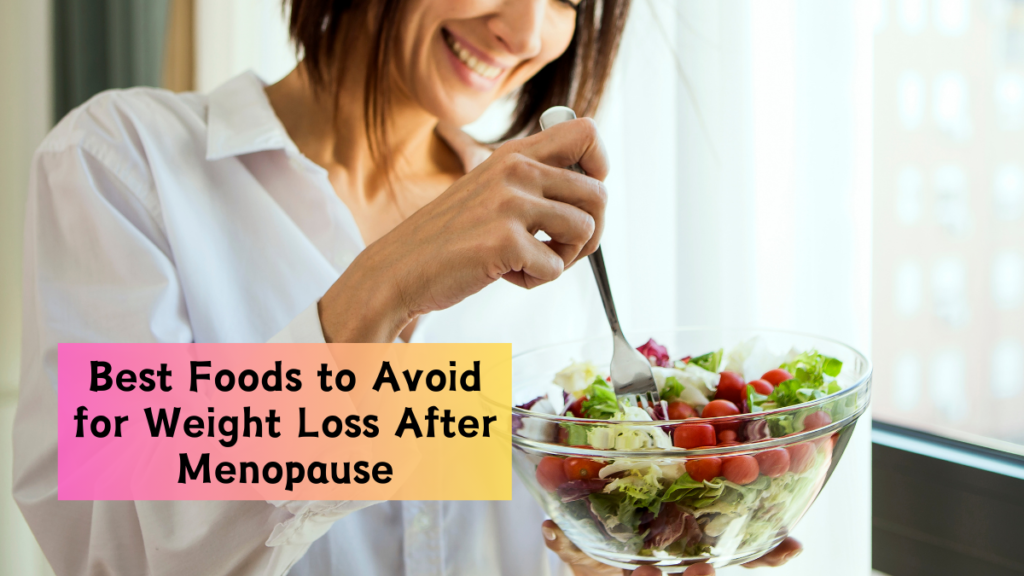Losing weight after menopause can be challenging due to hormonal changes, reduced metabolism, and lifestyle factors. Understanding which foods to avoid is crucial for effective weight management during this stage of life. In this article, we’ll explore five surprising foods that can hinder weight loss after menopause and provide actionable tips for a healthier diet.
5 Best Foods to Avoid for Weight Los
1. Sugary Beverages

Sugary beverages, including sodas, fruit juices, and energy drinks, are some of the biggest culprits behind weight gain during menopause. They provide empty calories without any nutritional benefits and can contribute to insulin resistance, making it harder to lose weight.
Instead, opt for water, herbal teas, or unsweetened beverages to stay hydrated and avoid the unnecessary sugar intake that can derail your weight loss efforts.
2. Processed Foods
Processed foods such as packaged snacks, frozen dinners, and fast food are typically high in added sugars, unhealthy fats, and sodium. These ingredients can disrupt your hormones and slow down your metabolism, making weight loss more difficult.
Focus on consuming whole, unprocessed foods like fruits, vegetables, lean proteins, and whole grains to support a healthy weight.
3. Alcohol

While an occasional glass of wine is not necessarily harmful, excessive alcohol consumption can sabotage your weight loss goals. Alcohol is high in calories and can increase your appetite, leading to overeating. It also disrupts sleep patterns and can affect hormone regulation.
Moderation is key; try to limit your intake and choose healthier alternatives like infused water or herbal mocktails.
4. Trans Fats
Trans fats are found in many processed and fried foods, such as margarine, fried snacks, and commercially baked goods. They raise bad cholesterol levels and increase inflammation, which can make weight loss more challenging.
Avoid these unhealthy fats and opt for healthier options like avocados, nuts, and olive oil, which support overall health and weight management.
5. High-Sodium Foods

High-sodium foods, including processed meats, canned soups, and salty snacks, can cause water retention and bloating, making you feel heavier and hindering weight loss efforts. Choose fresh, homemade meals where you can control the amount of salt added.
Use herbs, spices, and other natural flavor enhancers to reduce your sodium intake without sacrificing taste.
Why is Weight Loss Difficult After Menopause?
Menopause leads to a drop in estrogen levels, which can slow down metabolism, increase fat storage, and reduce muscle mass. Additionally, factors like poor sleep, increased stress, and reduced physical activity can make it more challenging to maintain a healthy weight.
Incorporating a balanced diet and regular exercise, along with avoiding the foods mentioned above, can help manage weight during this phase.
Recommended Foods for Weight Loss After Menopause
Instead of focusing only on what to avoid, it’s important to include foods that support weight loss and overall health during menopause:
- Vegetables: High in fiber and antioxidants, they promote fullness and reduce inflammation.
- Whole Grains: Unlike refined grains, whole grains provide essential nutrients and support digestion.
- Berries: Low in sugar and high in antioxidants, berries help manage weight and inflammation.
- Fatty Fish: Rich in omega-3 fatty acids, they support hormone balance and reduce inflammation.
- Lean Protein: Helps maintain muscle mass and boosts metabolism, promoting weight loss.
Foods to Avoid vs. Recommended Foods for Menopausal Weight Loss
| Foods to Avoid | Recommended Foods |
|---|---|
| Sugary Beverages | Water, Herbal Teas |
| Processed Foods | Fresh Fruits and Vegetables |
| Alcohol | Infused Water, Herbal Mocktails |
| Trans Fats | Healthy Fats (Avocado, Nuts) |
| High-Sodium Foods | Fresh, Homemade Meals |
Conclusion
Weight loss after menopause is achievable with the right dietary choices and lifestyle changes. Avoiding foods like sugary beverages, processed foods, alcohol, trans fats, and high-sodium items can significantly improve your chances of maintaining a healthy weight. Focus on consuming nutrient-rich foods, staying active, managing stress, and getting enough sleep to support your weight loss journey during menopause.
FAQs
1. Can I lose weight after menopause?
Yes, weight loss is possible after menopause with a balanced diet, regular exercise, and lifestyle changes. Avoiding certain foods can also make a significant difference.
2. Why do sugary beverages affect weight loss after menopause?
Sugary beverages contribute to insulin resistance and provide empty calories, which can lead to weight gain and make weight loss more challenging.
3. How can I reduce my alcohol consumption for weight loss?
Limit your intake to one drink per day or opt for healthier alternatives like infused water or herbal teas to avoid excess calories and better support weight loss.
4. What are some healthy fat options for menopause weight loss?
Healthy fats such as avocados, nuts, seeds, and olive oil can support weight loss and overall health, unlike trans fats found in processed foods.
5. Why is it important to avoid high-sodium foods?
High-sodium foods cause water retention and bloating, which can make you feel heavier and hinder weight loss efforts.
References
- Ben’s Natural Health. (2024). Weight Loss After Menopause: 6 Surprise Foods To Avoid. Retrieved from Ben’s Natural Health.
- Pure Wellness Pro. (2024). Weight Loss After Menopause: 5 Surprise Foods To Avoid. Retrieved from Pure Wellness Pro.
- Meraki Lane. (2024). Weight Loss After Menopause: 14 Foods to Eat and Avoid. Retrieved from Meraki Lane.
- Healthline. (2024). How to Lose Weight Around Menopause (and Keep It Off). Retrieved from Healthline.
- WebMD. (2024). Losing Weight After Menopause: Tips for Success. Retrieved from WebMD.



